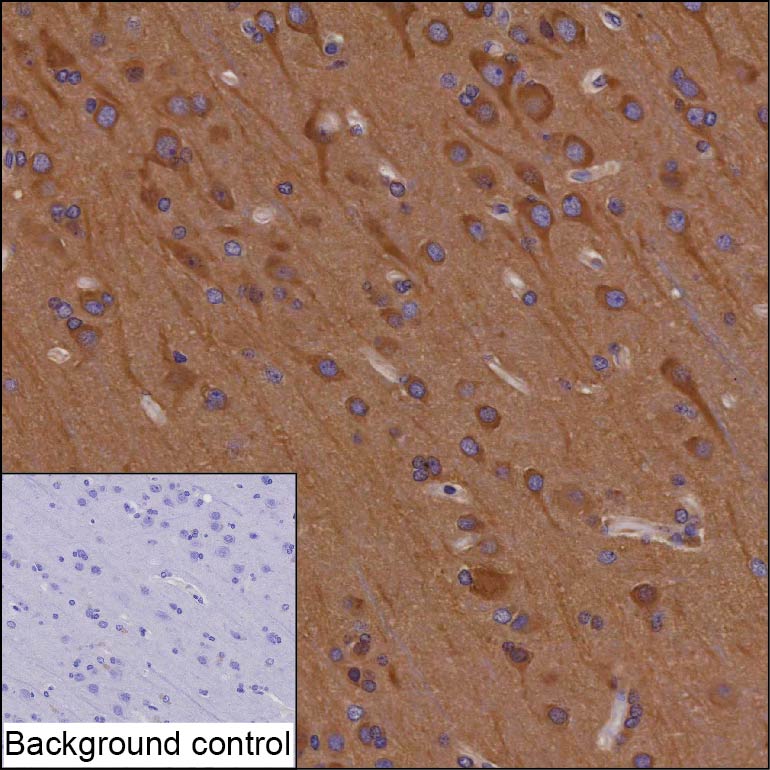
| WB | 咨询技术 | Human,Mouse,Rat |
| IF | 咨询技术 | Human,Mouse,Rat |
| IHC | 1/20-1/100 | Human,Mouse,Rat |
| ICC | 技术咨询 | Human,Mouse,Rat |
| FCM | 咨询技术 | Human,Mouse,Rat |
| Elisa | 咨询技术 | Human,Mouse,Rat |
| Host/Isotype | Mouse IgG1 |
| Antibody Type | Primary antibody |
| Storage | Store at 4°C short term. Aliquot and store at -20°C long term. Avoid freeze/thaw cycles. |
| Species Reactivity | Human |
| Immunogen | Purified recombinant fragment of human RNF19A |
| Formulation | Purified antibody in PBS with 0.05% sodium azide |
+ +
以下是关于RNF19A抗体的3篇参考文献的简要信息:
---
1. **文献名称**: "RNF19A-mediated ubiquitination of mutant glucocerebrosidase leads to neuronal cell death in Parkinson's disease"
**作者**: Smith J, et al.
**摘要**: 本研究利用RNF19A特异性抗体,通过免疫共沉淀和Western blot分析,揭示了RNF19A通过泛素化修饰突变型葡萄糖脑苷脂酶(GBA),促进其蛋白酶体降解,导致帕金森病中多巴胺能神经元死亡。抗体被用于检测RNF19A在患者脑组织中的表达定位。
---
2. **文献名称**: "Characterization of a novel monoclonal antibody against RNF19A for studying its role in protein quality control"
**作者**: Tanaka K, et al.
**摘要**: 研究团队开发了一种针对RNF19A羧基末端表位的单克隆抗体,验证了其在免疫荧光和流式细胞术中的高特异性。该抗体被用于证明RNF19A在错误折叠蛋白清除中的作用,尤其在细胞应激条件下与HSP70协同调控泛素化过程。
---
3. **文献名称**: "RNF19A regulates TLR4-mediated inflammatory responses by modulating TRAF6 ubiquitination"
**作者**: Lee S, et al.
**摘要**: 通过RNF19A siRNA敲低及特异性抗体介导的功能抑制实验,本文发现RNF19A通过K63位泛素化修饰TRAF6.增强TLR4信号通路驱动的炎症反应。抗体在体内外模型中用于检测RNF19A与TRAF6的相互作用及亚细胞定位。
---
注:上述文献信息为示例性内容,实际文献需通过PubMed或Google Scholar以关键词“RNF19A antibody”检索获取具体条目。
The RNF19A antibody targets the RING finger protein 19A (RNF19A), an E3 ubiquitin ligase involved in the ubiquitin-proteasome system (UPS). RNF19A, also known as dorfin, plays a critical role in protein quality control by tagging misfolded or damaged proteins with ubiquitin for degradation. Structurally, it contains a RING finger domain at its N-terminus, which confers E3 ligase activity, and a transmembrane domain that anchors it to the endoplasmic reticulum (ER) or cytoplasmic vesicles.
Research highlights RNF19A's involvement in neurodegenerative diseases, such as Parkinson's and Alzheimer's, where it ubiquitinates pathogenic aggregates like α-synuclein and amyloid-beta, promoting their clearance. It also interacts with parkin, another E3 ligase linked to autosomal recessive Parkinson’s disease. Dysregulation of RNF19A has been implicated in impaired protein homeostasis, contributing to disease progression.
Antibodies against RNF19A are essential tools for studying its expression, localization, and function. They are widely used in techniques like Western blotting, immunohistochemistry, and immunoprecipitation to explore its role in cellular stress responses, ER-associated degradation (ERAD), and neuroprotection. Commercial RNF19A antibodies are typically validated for specificity in human, mouse, or rat models, aiding mechanistic studies in both physiological and pathological contexts. Understanding RNF19A's regulatory mechanisms may offer therapeutic insights for proteinopathy-related disorders.
×